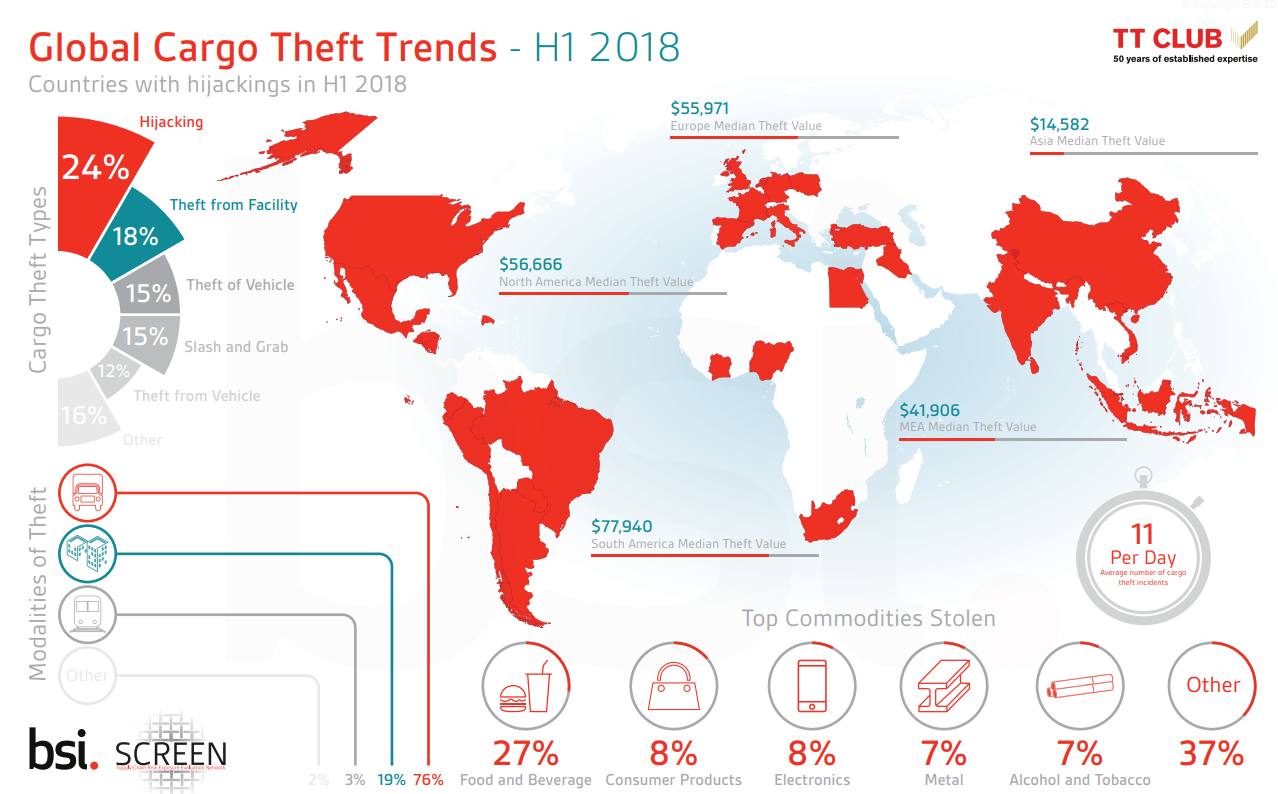Logistics insurer TT Club and BSI Supply Chain Services and Solutions announced the launch of the first joint 2018 semi-annual Global Cargo Theft Intelligence and Advisory Report, highlighting how cargo theft affects the global supply chain. The first edition of the new regular report reveals that violent truck hijackings account for 24% of cargo theft incidents globally, while the most targeted sector is food and beverage accounting for 27% of all incidents.
The report brings together threat and intelligence data from BSI’s supply chain security country risk intelligence tool, SCREEN and TT Club’s insurance risk management and loss prevention insights. In general, the report concludes that the most vulnerable point in the supply chain for cargo theft is when the cargo is in transit.
Key points
- In Asia, BSI most frequently records cargo thefts in India and China
- Supply chain corruption is a major element of thefts in India and China, with corrupt employees removing goods that they are transporting or accessing shipments stored in warehouses or logistics facilities. Corruption is also a key element in the Middle East and Africa.
- According to BSI incident data, cargo thieves in Indonesia most commonly steal shipments food and beverage items, followed by industrial and manufacturing materials and consumer goods. These commodities have remained the most frequently stolen products in Indonesia in recent years, with only minor variations among the top three categories.
- In Europe, the lack of secure parking for cargo trucks is a major driver of cargo theft trends in Europe. All major countries of concern for cargo theft in the region, such as the UK and Germany, lack a sufficient number of secure parking locations. Regulations that limit the length that cargo truck drivers can operate before taking a mandatory break also exacerbates the lack of secure parking and often force drivers to stop in vulnerable locations.
- Unlike other regions in the world, BSI most commonly recorded cargo truck hijackings as the primary type of theft in the Middle East and Africa.
- North America balances between two types of cargo theft, split between the more reserved thefts of unattended cargo trucks that BSI records in the United States and Canada and the aggressive and often violent, hijackings characteristic of Mexico and the majority of Central America.
- In contrast, thieves in Mexico and Central America utilize cargo truck hijackings as a primary tactic.
- No other region in the world suffers from a higher rate of cargo truck hijackings than South America.
Loss prevention tips
Whilst the trends in the regional reports demonstrate that there is no one size fits all solution to the threat of cargo theft, the reported recommended several best practices and processes which when adhered to can serve to mitigate the overarching risks:
- Due diligence: This is of utmost importance in all business undertakings. A primary objective being to protect your business from non-payment for services or to ensure that the customer you are acting on behalf of is legitimate and not themselves partaking in fraudulent business activities. It is recommended that freight operators develop and implement a robust approved contractor process which should be adhered to always, regardless of time pressures and implement procedures identifying the initial evaluation process, how the supplier will be approved and a monitoring procedure to ensure that the expected performance is maintained. Due diligence should be performed prior to any appointment, no matter how time sensitive the delivery may be.
- Contracting with service providers: Once due diligence has been completed and a suitable service provider identified, the contract with and the management of the service provider then takes precedent. It is recommended that freight operators ensure that:
-Your standard terms and conditions are adequately incorporated into the contract of carriage.
-You understand the terms and conditions of your subcontractor - Security Risk Management and Operational Protocols: It is recommended that due diligence is undertaken to understand the latest trends in terms of commodities stolen, to enable the freight operators to prepare and consider the most appropriate steps to mitigate the risk through the development and application of effective security risk management and operational protocols. The following items should be considered:
-Security Management
-Training
-Risk Management
-Workforce Integrity
-Operational Protocols.
Explore more herebelow:




































































